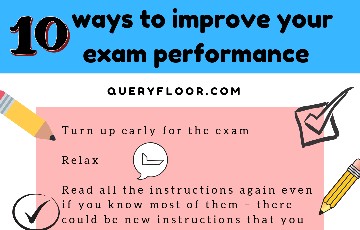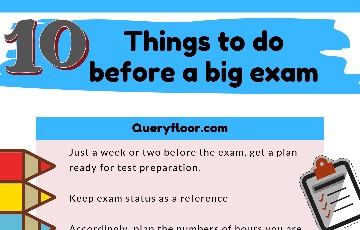
I) Time Management for getting Organized
II) No MultitaskingIII) Do not study at the cost of your sleep
IV) Set a schedule
V) Take notes
VI) Ask questions
VII) Study in a group
VIII) Facing the mistakes with courage and finding the methods to correct them
IX) Do not take much help from the parents
X) They know that life is much more than school, but together with it understand how important is the school
Your timetable should reflect your learning style. There are five different types of learning styles - they are:
- Visual learner – Learning by looking at a picture
- Aural learner- having an ear to the ground and picking up information by listening.
- Verbal learner- Learning by reading and writing
- Physical learner – learning by the physical presence
- Logical learner – learning by rationalizing
Find your learning style and according to that build your timetable.
You may even be a solitary learner or social learner. If you are a social learner, develop your timetable around group discussions.

You are fully prepared for your exam if you – take notes – followed up with study at home – revise – practiced the previous year's papers and now you are confident about taking the exam. But there are a few things you should do on the D-day of the exam to achieve the best possible exam results.
1) Turn up early for the exam.
2) Relax
3) Read all the instructions again even if you know most of them – there could be new instructions that you may not be aware of
4) Plan which ones you are going to attempt first
5) Start writing surely and with confidence
6) Answer as many questions as you can
7) Manage time effectively while attempting questions
8) Allot time for checking the paper again and again
9) In case you have more time after checking the paper you can attempt more questions that you are sure of the answer to.
10) Finally, analyze your performance.

There are 10 things to do before a big exam or when you receive your exam timetable.
1) Just a week or two before the exam, get a plan ready for test preparation.
2) Keep exam status as a reference
3) Accordingly, plan the numbers of hours you are allotting for studies.
4) For practical subjects like Math and Science give equal importance to both theories and practice time sessions
5) Next plan how you are going to utilize it to cover all the subjects for the exams.
6) Practice more past papers to get the hang of the exams
7) Eat good food
8) Do not ignore your night’s sleep or else you will be groggy
9) Instead of sitting at your study desk at all hours, take out some time for exercise, at least try walking
10) Most importantly do not panic. Just be a cool and complete revision
"The road to success and the road to failure are almost exactly the same." -- Colin R. Davis
Here are some tips to follow if you are underperforming your aptitude:
1) Accept the fact and denying only delays time
2) Adopt a positive attitude now to stay on course
3) Check the areas you are underperforming
4) Analyze your weak areas and allot more time to them
5) Talk to teachers and seek study tips
6) In class follow what is going on with utmost concentration
7) Take notes writing to the next level – write crisp notes, compare with friends, and review once the chapter is done
8) Ask if you need any clarifications
9) Allocate more time to studies – avoid other activities which consume your time
10) Improve your language skills to communicate in your answers better
11) Try memory improving techniques
12) Tomorrow never comes! Do not postpone!
13) Take the help of friends or a study group
14) Take tests regularly
15) Revise for longer even before you get your exam timetable
16) Take care of your health; sometimes health issues could reduce your grades
17) Refer to other sources for studying
18) Self-tests also help
19) Be cool on the day of the exam and do your best
Here are 10 ways to improve your exam performance by making learning a fun activity
1.) Sometimes studying while music plays in the background is a great idea.
2.) Drawing diagrams, figures, or doodles while making notes would increase your interest in going back to them for revision.
3.) Roleplay is one way to enjoy studying literature.
4.) Turn your course content into puzzles, flashcards, or quizzes.
5.) Get your friends along to join the fun.
6.) Use interesting stationery to add zing to your learning.
7.) Give yourself tiny challenges.
8.) Make a chapter into a nice story or a comic. Comics never fail in most cases.
9.) A change in location is what the doctor ordered if you feel sleepy on your study table.
10.) Finally, you can try to combine your study with other activities such as sports, socializing, pursuing your hobby, or just taking a rest.

- Create a mindset that you should listen and not be distracted.
- Sit in of the rows in the front side of your class.
- Use a stress ball or fidget spinner to remove stress.
- Participate in class sessions.
- Avoid all distractions during class such as social media.



